Import from GitLab
The import from GitLab lets you migrate projects, issues, comments, users, and other data from GitLab to YouTrack.
A setup wizard navigates you through the import configuration process. It prompts you to enter the connection settings and lets you map projects in YouTrack to projects in GitLab. If your project has any custom settings, you can edit the import script in YouTrack directly.
Prerequisites
Before you import projects from GitLab to YouTrack, check the following requirements:
Your GitLab version is 13.8 or later.
Your GitLab server is accessible to inbound connections. Specifically, you need to make sure that your network doesn't block requests from YouTrack to GitLab.
The account that you use to connect to GitLab has access to the GitLab project that you want to import. This is the user account whose private access token is used for authentication.
You have direct access to log in to the source application using a password or token.
YouTrack's import engine doesn't support authentication through external authentication modules.
Import Details
If the GitLab database contains references to entities that do not exist in YouTrack yet, they are created. The YouTrack user account you use to run the import should have enough permissions to create all imported entities. We recommend using an account with a System Admin role or the Low-level Admin Write permission to run the import.
Imported Entities
Here is the list of entities that are imported from GitLab and their mapping to YouTrack entities:
Entity in GitLab | Entity in YouTrack |
|---|---|
Projects | Projects |
Issues | Issues |
Epics | Issues |
Issue field values | Custom field values |
Wiki pages | Articles |
Comments | Comments |
Labels | Tags |
Issue history | Issue activity items Currently, history import is limited. For details, see Import Limitations. |
Users | Users |
Attachments | Attachments Currently, attachment import is limited. For details, see Import Limitations. |
Milestones | Values of the |
Linked issues | Issue links |
Import Limitations
Due to GitLab and YouTrack API limitations, YouTrack imports some entities partially or doesn't import at all. The following import limitations are in place:
Entity | Details |
|---|---|
Attachments | Only image attachments in issues are imported. In some cases, image attachments in articles can also be imported. Each issue with a missing attachment will be marked with the |
Historical events | YouTrack imports historical events for |
Work items | Work items are not imported. |
Issue fields | YouTrack imports all issue fields except |
Boards | Boards are not imported. |
Set up an Import from GitLab
Before you add a new import configuration, you need to create a personal access token that will grant access to the target project in GitLab. Then you can use the token for authorization when setting up the import in YouTrack.
Create a Personal Access Token in GitLab
To set up an import of issues from GitLab, first, you need to create a personal access token in GitLab.
To create a personal access token in GitLab:
Log in to GitLab with an account that is granted administrative permissions.
Click your avatar in the upper-right corner.
Navigate to the Preferences > Access tokens page.
Enter a name for the token.
Set the Scopes for the token. The import requires
read_apiandread_userscopes.Click the Create personal access token button.
The new personal access token is created.

For more details on creating personal access tokens, refer to the GitLab documentation.
Configure an Import from GitLab in YouTrack
The setup wizard guides you through the setup process.
To configure an import from GitLab:
From the Administration menu, select .
Click New import to open the setup dialog.
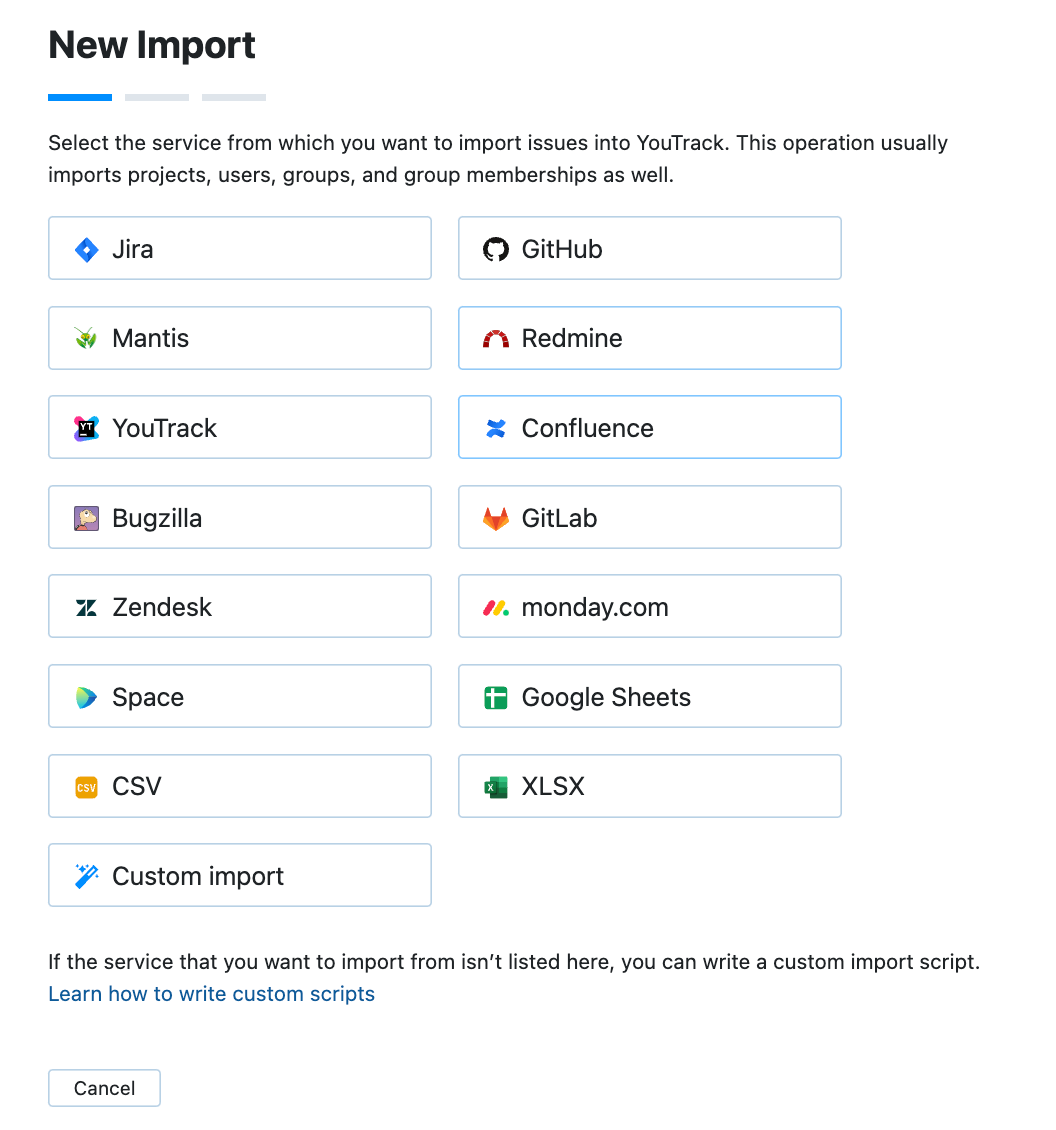
Select GitLab.
Settings for a New Import from GitLab are displayed.
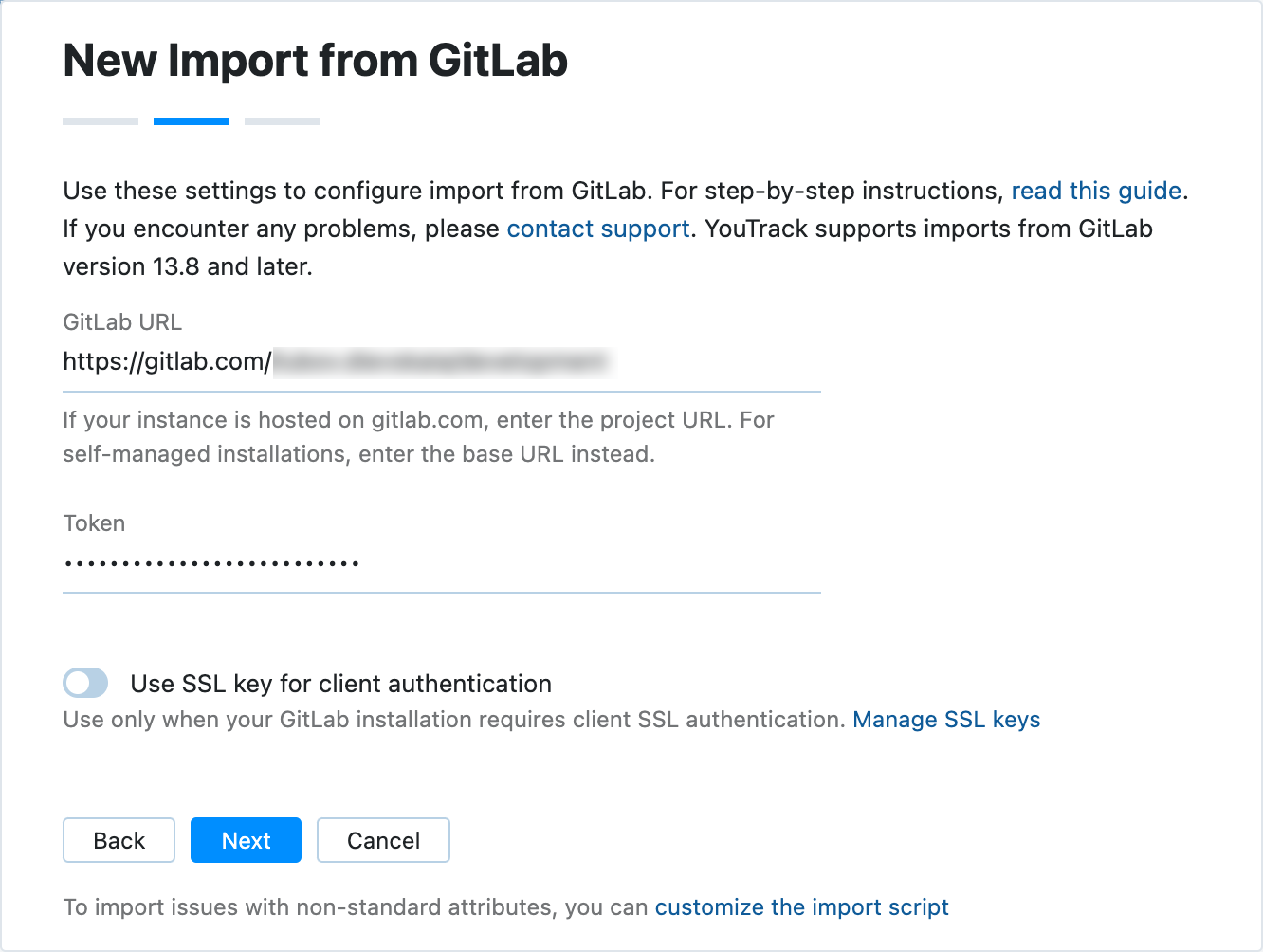
Enter values for the following settings:
Setting
Description
GitLab URL
The URL of your GitLab.
If your instance is hosted on gitlab.com, enter the project URL. For self-managed installations, enter the base URL instead.
Token
The personal access token that you have generated in GitLab to access the target issues.
If required by your GitLab installation, enable the Use SSL key for client authentication option.
Сlick the Next button.
The second set of import settings is displayed.
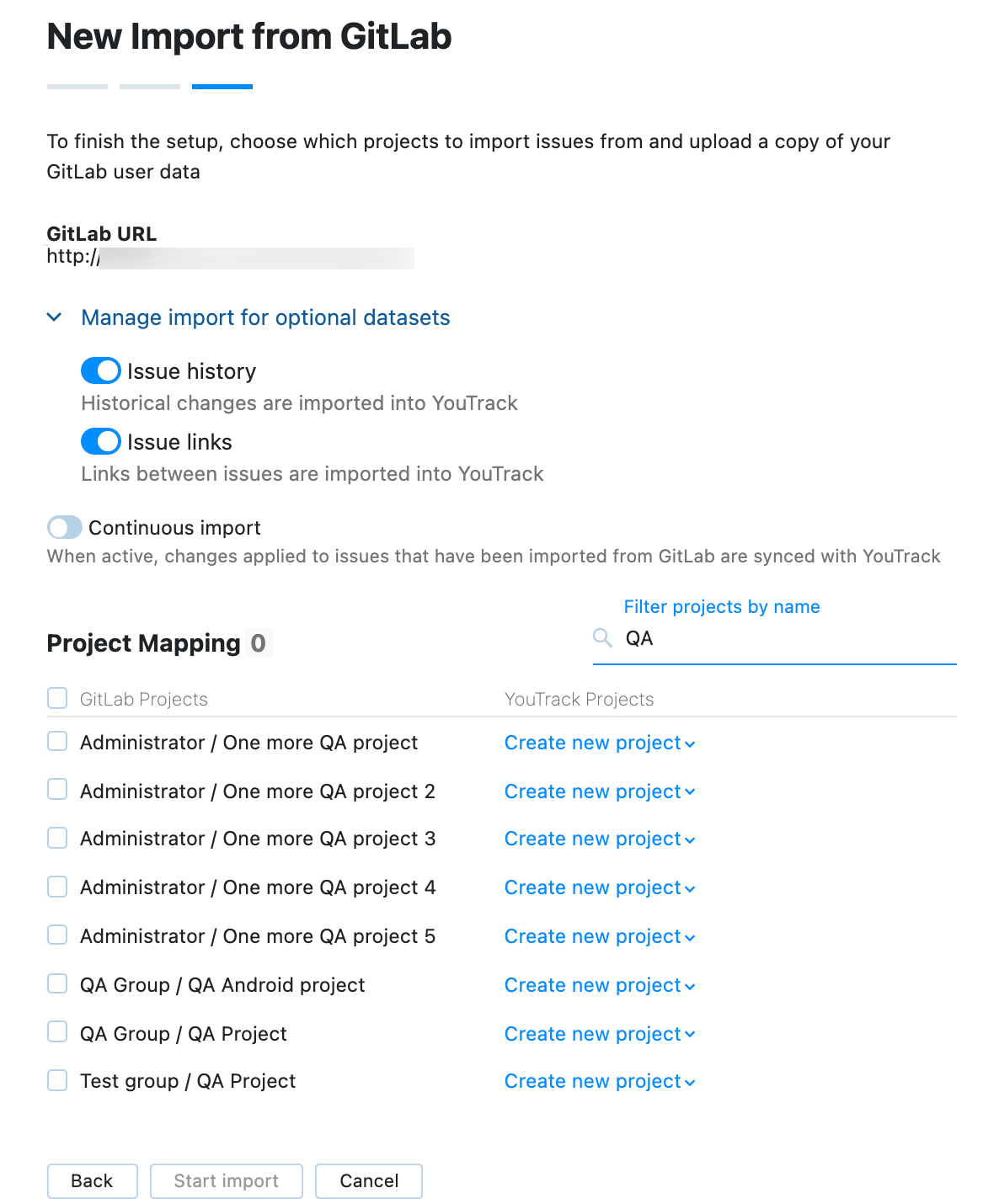
Expand the Manage import for optional datasets section. Here you can configure the import engine to ignore certain parts of the source database during import.
Setting
Description
Issue history
Disable this toggle to ignore historical changes of issues during import.
Issue links
Disable this toggle to ignore links between issues during import.
By default, these toggles are enabled. This means that YouTrack will pull historical changes and issue links from the import source if the import script supports it.
Select the GitLab projects and the target YouTrack projects for the import. For more details about project mapping configuration, see Project Mapping.
Optionally, enable the Continuous import. When enabled, YouTrack will periodically poll the selected GitLab projects and import updates that were made since the last sync.
Click the Start import button.
YouTrack will create new projects and import data to the existing ones according to the configured project mapping.
YouTrack will import issues, articles, and users to the target projects.
If the Continuous import option is enabled, YouTrack will periodically check target GitLab projects for updated and new issues.
When you have set up an import, it is shown in the Imports list. To view configuration and import details, select the import configuration from the list.
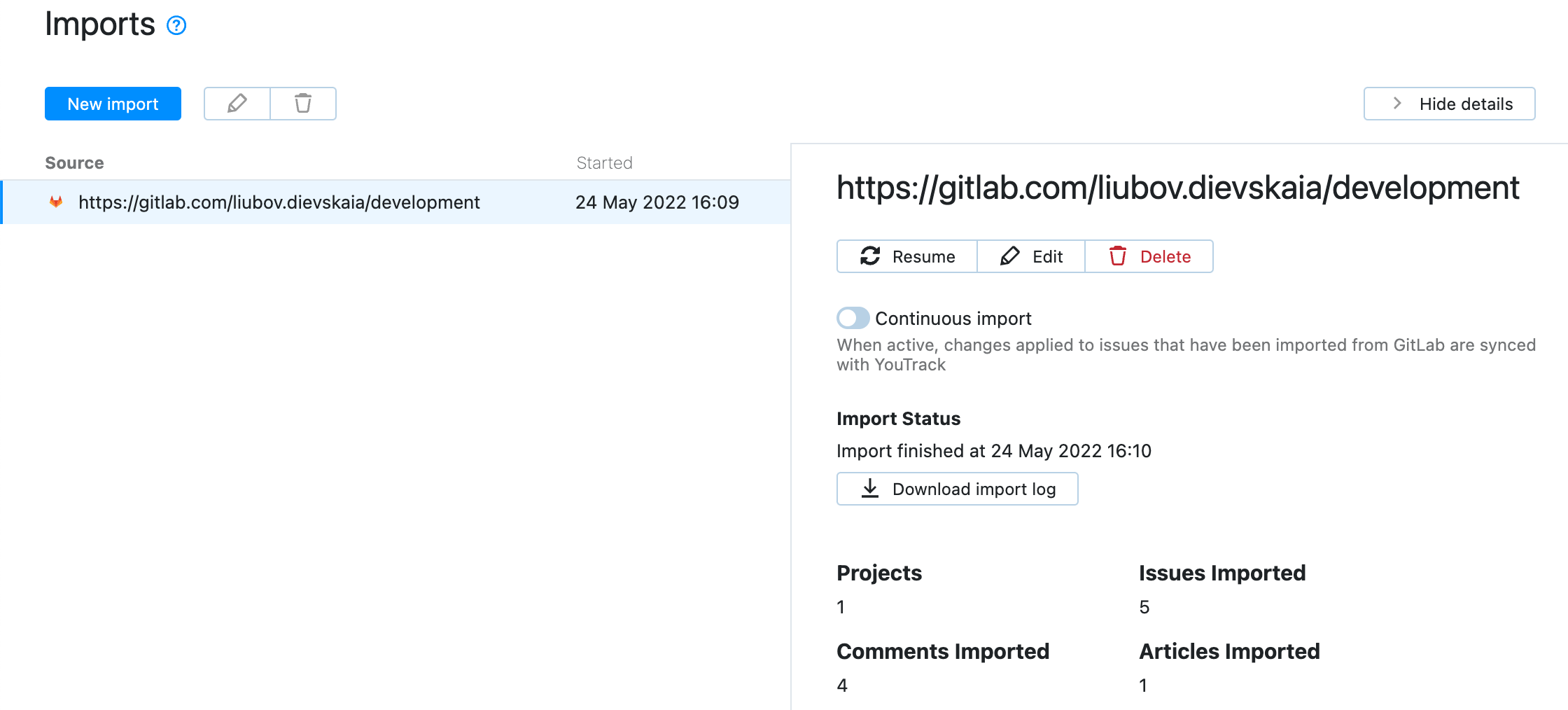
In the sidebar, YouTrack shows the import status and additional information about the imported data. Click the Resume button in the toolbar to import updates from the connected GitLab project.
You can also download the import log file to study and investigate when needed.
Project Mapping
If your GitLab is self-managed, you can import multiple projects from GitLab to YouTrack within one import configuration.
On the final step of the import setup, you can select those projects that you want to import to YouTrack. You can also choose whether to create a new project for the import or import data into an existing project in YouTrack.
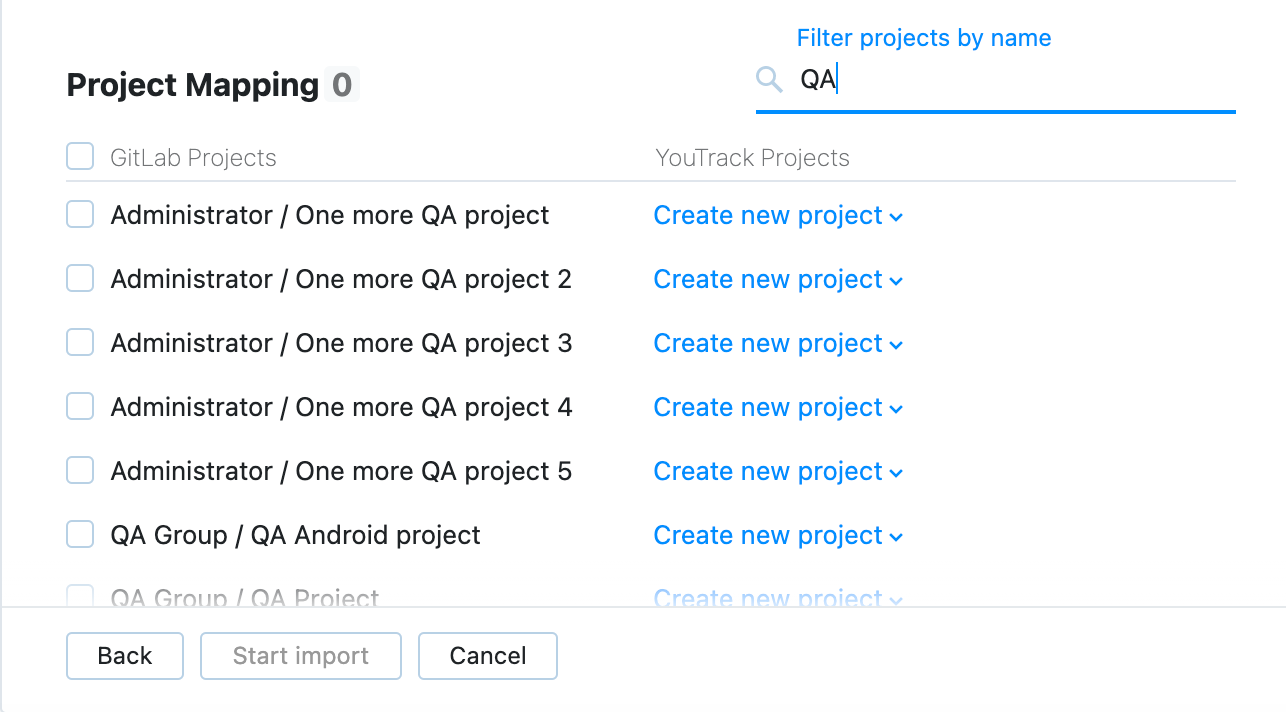
To configure project mapping:
Locate those GitLab projects that you want to import. Note that the GitLab project names on the list include the name of the group they belong to.
Use the filter bar on the right to filter projects by name.
Select the projects that you want to import. Select the option at the top of the list to import all available GitLab projects.
Select a target YouTrack project for each GitLab project.
When loading the list of GitLab projects for mapping, YouTrack checks for existing YouTrack projects with corresponding names. If it finds a YouTrack project with the same name as the GitLab one, YouTrack suggests it as the target project.
If there is no existing YouTrack project with the corresponding name, YouTrack suggests creating a new one.
If you want to change a target project, select another option from the corresponding dropdown on the list.
Click Start import to finalize import setup and start import.
Import starts.
Import Options
After the initial import, the following controls are available in the sidebar:

Control | Description |
|---|---|
Resume | Immediately imports any changes made in the selected GitLab projects after the previous import. |
Edit | Opens the integration settings page in edit mode. Use this option to connect to a different GitLab instance, update the login credentials, or update project mapping. |
Delete | Deletes the current import settings. Projects, issues, comments, users, and groups that were imported from the connected GitLab instance are not affected. If you delete the import settings and connect to the same GitLab instance, the issues are re-imported into existing projects with new issue IDs. |